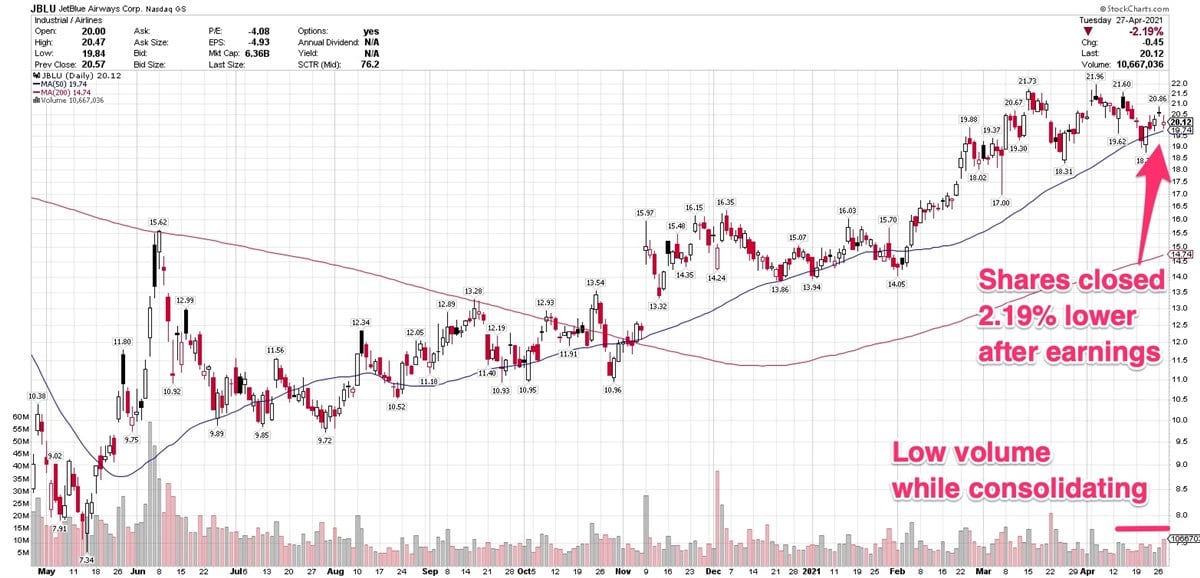Like other airlines reporting in recent weeks, JetBlue delivered better-than-expected results. Nonetheless, investors aren’t yet ready to get onboard to send share prices flying higher.
Free Book Preview
Money-Smart Solopreneur
This book gives you the essential guide for easy-to-follow tips and strategies to create more financial success.
4 min read
This story originally appeared on MarketBeat
JetBlue Airways (NASDAQ: JBLU) traded lower Tuesday following a better-than-expected first-quarter report.
Shares closed Tuesday at $20.12, down $0.45, or 2.19%.
In its report, the New York-based airline offered a promising glimpse of the current rebound in leisure travel, which could bode well for the beaten-down travel industry.
The company lost $1.48 per share, beating Wall Street’s consensus estimate of a $1.68 per share loss. Revenue was $733 million, also ahead of expectations.
It beat estimates in three of the past four quarters.
JetBlue, like the rest of the travel industry, has been walloped since the first quarter of 2020, as pandemic closures began in March of last year. The company had a string of profitable years, which snapped last year.
JetBlue finished 2020 with a loss of $5.68 per share. As of now, analysts expect a loss of $2.61 per share this year, with a return to profitability in 2022.
However, the company’s chief operating officer, Joanna Geraghty, told CNBC that leisure travel is leading the current rebound, meaning results may exceed Wall Street’s current expectations. She cited travel to Florida and Caribbean destinations as particularly strong.
Breakeven in Q3?
The company guided toward a 30% to 35% revenue decline, but said it expects to break even in the third quarter, on an EBITDA basis.
It’s posted year-over-year revenue declines in each of the past five quarters, which should come as a surprise to absolutely no one.
The airline has heavy exposure to the northeastern U.S., which was hit harder by last year’s lockdowns than other parts of the country.
Last week, JetBlue announced an alliance with American Airlines (NASDAQ: AAL) that adds 24 routes to eight cities. JetBlue touted the deal as a low-cost travel alternative for customers leaving from northeastern airports, such as New York’s LaGuardia, that have been constrained in terms of adding new flights. Customers will also receive reciprocal frequent-flier benefits from both airlines.
JetBlue also announced that it will begin service to the U.K. in the third quarter.
”This approval marks the first scheduled foreign carrier permit that has been issued to a new operator since the U.K.’s exit from the European Union,” said the U.K.’s airline regulatory agency in a statement.
JetBlue has not said what U.K. airport it will use, but public information from U.K. airline authorities indicates slots were allocated at London’s Heathrow airport.
Airlines Guiding Higher For 2021
Airline stocks, as a group, rallied Monday on news that the European Union would open up travel to Covid-vaccinated Americans this summer. Hotels, cruise lines and other leisure-related stocks rallied as well.
Despite the dismal situations for airlines over the past year, JetBlue’s stock price was not grounded. It flew 158.74% over the past year, 41.47% year-to-date and 38.52% in the past three months.
The stock attempted a rally earlier this month, but couldn’t overcome price resistance between $21 and $22. It’s working on its third week of a consolidation, so it’s too soon to call this pullback a proper base, which takes a minimum of five weeks to form.
Trading volume has been below average in the past four weeks, a good sign as the stock is consolidating or struggling to take flight.
In recent weeks, American Airlines, Southwest Airlines (NYSE: LUV), Alaska Air Group (NYSE: ALK) and Spirit Airlines (NYSE: SAVE) reported better-than expected results, and guided toward growth this year.
It’s possible that it will take more than these reports to send the industry’s stocks appreciably higher, as stocks were already taking off on hopes of clear skies ahead.
One headwind could be higher fuel prices, which may cause carriers to raise ticket prices, which may keep travel subdued. On the other hand, pent-up demand could mean consumers aren’t fazed by ponying up more money to travel. Continued weakness in business travel may also keep a lid on revenue. 
Featured Article: How to Invest in a Bull Market